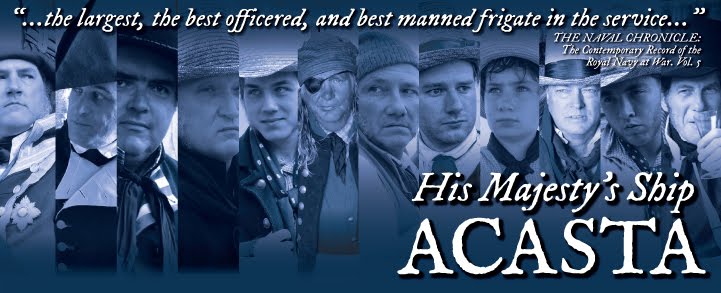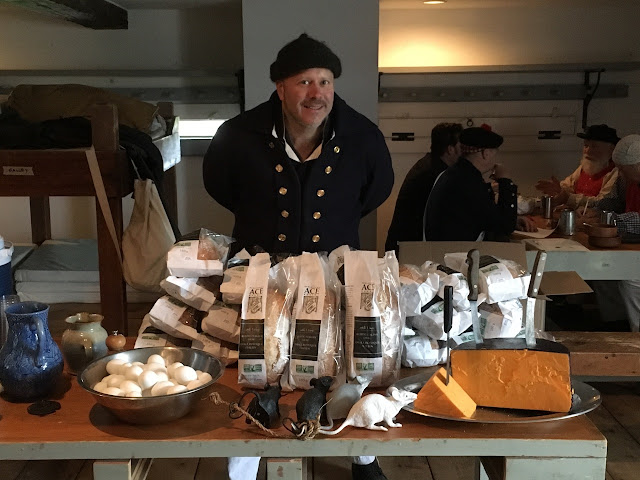THE COMMANDER
Within the context of the 21st century, the Captain of the HMS Acasta is Robert Fryman, a soft-spoken and eccentric instructor of German and Military History at Massanutten Military Academy in Woodstock, Virginia. Prior to arriving at MMA, Fryman earned a Ph.D. in Anthropology from the University of Pittsburgh concentrating in the historical archaeology of the 18th and 19th centuries and previously taught as a professor of Anthropology at Kent State University and Georgia State University. He is an active bridge officer in the United States Coast Guard Auxiliary and brings his love of the sea to his interpretations of 18th and 19th century sailing.
Fryman spends his much of his “copious” free time researching and studying the naval technology and sailing practices of the British and American navies of the 18th & 19th centuries. He most commonly can be found in his study at “Friedlichkeit”, his home in the Shenandoah Valley, poring over period manuals, journals, and historical fiction relating to the “Age of Fighting Sail.”
Fryman has been interpreting history and reenacting since 1977, traveling through time to the American frontier of the 18th century, the War of the Rebellion, to the struggles on the Western Front in 1917. As the “Captain”, Fryman has developed interpretive programs on the duties, responsibilities and life of a British naval captain during the Napoleonic Wars which have been presented to public groups and historical sites in the eastern United States. His presentations are guided by his love for passing on the knowledge of life and sailing aboard the tall ships during the height of the Age of Fighting Sail.
When not pacing the windward side of the quarter deck of the HMS Acasta, or teaching German in a classroom, Fryman stays busy reading, researching, and chasing after his dachshund, the Herzogin Audrey, affectionately known as “Tuti”.
 THE DOCTOR
THE DOCTOR
In your 'modern world', the Doctor is Albert Roberts, mild-mannered high school Visual Communications teacher. Before teaching, Roberts was a professional Graphic Designer for ten years for various design firms and sign companies.
Roberts spends his free time in the pursuit of strange and obscure medical and scientific knowledge of the 18th & 19th centuries, and typically has a heap of books on his night stand that range from period texts and journals to historical fiction.
Roberts has been interpreting history and reenacting since 2001. As the Doctor, Roberts has gone on to bring his medical demonstrations to historical sites and events all over the eastern United States, to the praise of public and reenactors alike.

When asked why he doesn't portray a specific doctor or surgeon from history, Roberts replies, "My love is for passing on the knowledge of the medical and surgical techniques... not for trying to BE some particular historical figure. That way, the public doesn't get hung up on who I AM, but instead what I'm DOING becomes more central. Just as it SHOULD be."
When not saving the past from disease and injury, or teaching design to the next generation in a classroom, Roberts stays busy chasing after his four daughters who range in age from 13 to 6.
FIRST LIEUTENANT
Jim Hamilton was born and raised in Maryville, Tennessee and is of Scotch-Irish descendent. Hamilton is the 10th generation living in Maryville and the 5th generation of his family living in his current home which was built in 1899.
Hamilton spent most of his career in management roles including the last 16 years as either a CFO of Executive Vice President of midsized manufacturing firms. He is currently the Chief Financial Officer at Broadway Electric Service Corporation. For 15 of those years he worked for foreign companies (mainly British) and worked and traveled abroad extensively, primarily in the UK, Germany, Italy, and Russia, and Canada.
Hamilton has always loved history and reading and believes that this passion was fueled by being able to visit many historical European sites.
He began reenacting in 2000 portraying American Continental Light Infantry from the Rev. War where he currently portrays a Sergeant. This unit finds on average 25 solider per event and can field a total of 40. He also portrays a French and Indian British Private at Fort Loudon as a member of the Independent company of South Carolina. On some occasions you might find him in Colonial Militia garb when no other uniform will work.
Along with commanding, soldering, and “civilianing,” Hamilton has a great passion for period cooking and often prepares meals at events. He has also been a wine maker for 25 years, and loves sharing wine with his reenacting companions.
Hamilton graduated from the University of Tennessee with a degree in Accounting & Finance with a minor in Geography in 1986. Jim is married and has two sons, Houston (16) and Alex (13) and a niece Taylor who all enjoy history and reenacting.
 THE SECOND LIEUTENANT
THE SECOND LIEUTENANT
In another day and time Lt. Michael Ramsey recently graduated from University with a degree in history. Ramsey works in various positions at Burdett’s Tea Shop and Trading Company and as a Research Annalist with a Health Care Consulting Firm. When not at work, Ramsey spends much of his time as father to his 6-year-old son.
In his “spare” time, Ramsey continues studying history, particularly British and American history during the late eighteenth and early nineteenth centuries. Ramsey has participated in living history since 1997 time traveling from the Norman Conquest of 1066 to the battlefields of Europe during WWII.
Ramsey only began interpreting 18
th and early 19
th century history in 2004 and has done so for the public through living history event, lectures, and demonstrations. For the past three years Ramsey has enjoyed recreating historical clothing, equipment, and other articles of material culture.
THE THIRD LIEUTENANT
Lt. Thomas Tumbusch is the son of a Royal Navy officer who hails from Portsmouth, a seaport and naval base in Hampshire, England on the island of Portsea in the English Channel (also the modern-day home of HMS Victory, Lord Nelson’s flagship at the Battle of Trafalgar). Through a connection with one of his father’s former shipmates, he began his naval career at the age of 10. He previously served under Captain Fryman as a midshipman, and has since returned to his service after being re-posted to the Acasta as Third Lieutenant. While serving on the North American station out of Halifax, he had the good fortune to secure the affection of Antonia Norton, a tailor’s daughter, which enables him to sport much finer uniforms than he would otherwise be able to afford.
In the twenty-first century Mr. Tumbusch is a freelance commercial copywriter who specializes in marketing copy for the creative industry and green businesses (for more details, visit
www.wordstreamcopy.com). He has taught historic dance to people of all ages since 1988, and enjoys woodworking projects that re-create items from the Revolutionary War through the Arts and Crafts period.

 THE PARSON
THE PARSON
John Frank Jarboe was born in Breckenridge County Kentucky and raised on a farm near the tiny town of McDaniels. Graduating from high school in 1973 he was never interested in history. But since, in addition to tracing his genealogy back to the 11th century, Frank has spent the past 25 years researching the events surrounding The Second Great Awakening of 1800 and the religious atmosphere in the 17th to the early 19th centuries.
Frank spent 35 years as a photographer, with most of those years being the manager of a professional photofinishing lab. In addition to his years in photography, Jarboe and his wife Carol along with their two daughters operated a small farm on which they raised sheep, horses and chickens. They also ran a horse-drawn carriage service for 10 years. Frank & Carol are grandparents to 6, one of which resides in heaven.
Frank & Carol’s journey into reenacting began in 2003 with the idea of incorporating Frank’s research into the persona of a frontier minister. Since that time, the couple has traveled extensively (averaging about 44 weekends each year) doing 18th c. presentations as Parson John and his indentured servant Maggie Delaney – or early 19th c. as Rev. John P Griswold (a family name) and Lady Caroline Linnington. As an ordained minister, Rev. Jarboe regularly conducts time/place appropriate church services along with other ministerial duties such as weddings and funerals.
www.parsonjohn.org
 THE SURGEON'S MATE
THE SURGEON'S MATE
Jean Baptiste Girard, surgeon's mate on the HMS Acasta, could well be the hypothetical great grandfather (many times removed) of Tony Gerard. For over 20 years Tony has taught biology and physical geography at Shawnee Community College in southern Illinois. Prior to that he taught junior high/high school biology and earth science in central Illinois.
When he can find the work, Gerard works part time in film production. Beginning as one of the core extras in "Last of the Mohicans", he has worked on over thirty other productions to date. A self professed "nature geek", he lives with his wife Berna and their twin sons on the edge of Wildcat Bluff in the Cache River State Natural Area.
In addition to living history they are both active volunteers in local environmental educational programs. Reptiles and amphibians are of special interest and they share their home with varying numbers of turtles, snakes, salamanders and frogs.
Gerard began re-enacting in the early 1980s with the eastern frontier of the 18th and early 19th century as his area of special interest. Portraying a naval surgeon's mate is an entirely new endeavor. His favorite facet of this new persona? "I've been fortunate to be able to travel to some far off places in my life. Portraying a well traveled old sailor allows me to incorporate some of those far off experiences into my 19th century persona".
 THE SERVANT
THE SERVANT
Aboard the Acasta, James Vasserman acts as the Doctor's personal servant. His occupation in the modern world is quite different. Vasserman lives in his 21st century world as an avid historical clothing researcher, re-creator, and advisor, and was recently engaged to utilize his historical clothing knowledge to retool a popular annual program at a well known historic site.
When not advising historic sites on their textile collections, sewing for himself, others, and his shipmates, or attending events in the most stylish garb, Vassermann can be found surrounded by books and internet archives researching every minute detail he can find.
It has been mentioned privately that Mr. Vassermann bears a striking resemblance to the
lovely young wife of Doctor Roberts. We don't see it.






































